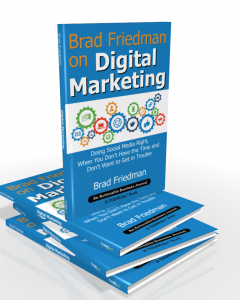The psychology of trust and inbound marketing isn’t entirely new. It’s new in the virtual world. Learning about a product or service from a friend on social media or a blog is a relatively new development which wouldn’t have been possible before the spread of the internet.
But even before we had the internet, people did hear things via word of mouth. You might have picked up the phone and consulted a friend about a problem you were having and then received a recommendation regarding a product or service.
 At that point of, you wouldn’t have been able to look up that product or service on the internet. But you might have been able to do so in the yellow pages or by going to the store and inquiring about it.
At that point of, you wouldn’t have been able to look up that product or service on the internet. But you might have been able to do so in the yellow pages or by going to the store and inquiring about it.
And, once a customer has made the effort to look into a product or service to this extent, they’re already biased in its favor. The sale is as good as made, unless the product is really not a good fit for the customer’s needs.
So in some ways, we see that inbound marketing is nothing new. Word of mouth has been instrumental in spreading the word about products for a while now. The only thing that’s different is that this is now being done on the internet.
The Psychology of Word of Mouth
If you stop to think about it, word of mouth has always been considered the best way to increase your clientele. It’s the most effective way to get someone to consider buying your product. This is because people trust what their friends and family tell them.
I am close to my friends and family. They are more like me than anyone else in the world. We live in the same geographic area and we have the same background. So our needs are also likely to be more similar. So if my friend finds that a product works for her, then it is also likely to work for me. At least this is how the thinking goes.
The Psychology of Internet Recommendations
Nowadays, with the internet, people think the same way when they receive a recommendation via social media. Receiving a recommendation on Facebook has almost the same effect as receiving it in person or over the phone.
But on the internet, there’s also the possibility of receiving a recommendation from a blogger or another source whom you trust. The key word here is “trust.” If I like and follow a certain blogger, it’s obviously because what they say appeals to me. I trust their expert opinion. So I am likely to check out something that they recommend.
The Psychology of Trust and Inbound Marketing
Personal recommendations work because of the closeness, similarity and trust between two people i.e., they work because two people have a good relationship. In contrast, if someone I dislike recommended something to me, I would not take it seriously at all.
So a marketer has to understand that the entire world works on the basis of relationships. You have to trust someone in order to accept their recommendations. You have to feel that they have your best interests in mind. Or else you won’t want to follow through on what they say.
Inbound marketing is such a powerful took because it takes the element of trust which has already been developed and expands upon it further. The customer comes to you with the trust element fresh in their mind. So you need to take advantage of this and present yourself as worthy of that trust.
Transparency and Clarity
In order to earn the customer’s trust, you need to be forthright about what you’re offering and what you aren’t. You also need to be transparent. This means foregoing all the jargon. People don’t really have the time to sit down and figure out what you’re trying to say. You need to spell it out for them.
In this day and age, when we’re all surrounded by different forms of marketing, people have learned to spot and value sincerity. So the idea, with inbound marketing, is to stop hustling and to develop relationships based on trust. In order to do this, you need to know your customers and they also need to get to know you. So there has to be transparency on both sides.
Reading Between the Lines
There’s no reason why the customer shouldn’t be honest with you about what they are looking for. Although sometimes, people have certain needs that they are reluctant to express, out of a feeling of embarrassment or a fear of ridicule. In this case, it might be up to you to read between the lines.
For example, someone who’s overweight might feel embarrassed to admit that they need a product or service to help them lose weight. Or they may be embarrassed to admit that they need plus-size clothes.
But this doesn’t only apply to overweight people. It applies to people in general. Everyone has certain needs that they feel embarrassed about, for no apparent reason. It all depends on the values with which they have been raised and what they have been criticized and praised for throughout their lives.
So the idea is to read between the lines and recognize what customers are looking for when they come to you. Making them comfortable enough to talk about what they want and need and letting them know how your product or service can help are the main aims of inbound marketing.
Contact us to gain a further understanding of the psychology of inbound marketing.









